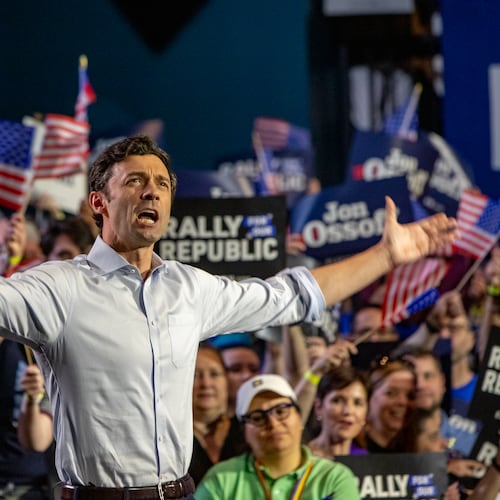If metro Atlanta voters in 2012 approve a tax to pay for transportation projects, they also may have to pay a toll to drive some of them after they’re built.
The small group that will winnow down the Atlanta region’s project list met for the first time Friday, and they discussed some of the rules they’ll use. Among their first decisions, strongly backed by the state transportation planning director: They’re not ready to rule out toll projects.
Tolls and mass transit are just two of the touchy issues the executive committee will grapple with as it builds a project list for voters to consider in a 10-county referendum in 2012. Over 10 years, the 1-cent sales tax is likely to bring in perhaps $8 billion, according to state figures.
Next week is the deadline for counties and cities to send in their wish lists, and some are already arriving. Sandy Springs was first in the gate, with a request including a rapid transit bus system on the top end of I-285 and sorting lanes along Ga. 400.
After the meeting Friday, Atlanta Mayor Kasim Reed defended the group's decision to leave toll projects on the table for now.
He said that for one thing, their task at this point is to assemble an “unconstrained” wish list. Ruling out anything at all now defeats that purpose, he said.
But in general, said Reed and some other officials, if tax money will be required for toll projects anyway, why not tax money from the referendum?
“I’m comfortable with some toll projects because they’re going to be implemented through referendum,” Reed said. “I would never support a toll project that was not approved by the voters.”
Decatur Mayor Bill Floyd, also on the committee, pointed out that mass transit projects also require a lot of tax money to build, and they still charge travelers a fee.
Metro Atlanta's current toll plans are not about making a profit: Mostly, they won't. The state will need up to $400 million in tax money to put optional toll lanes alongside I-75 and I-575 in Cobb and Cherokee counties, according to the state Department of Transportation. The state is currently putting an electronic toll system on the HOV lane of I-85 in Gwinnett County at a cost of about $60 million, and it hopes eventually to toll other metro Atlanta HOV lanes.
Additional possibilities include toll lanes alongside I-285 and on Ga. 400, said Todd Long, the state’s transportation planning director.
Such projects may be the group's great dilemma. State officials believe optional toll lanes are among the best tools to offer regional congestion relief, serving exactly the function the regional referendum was meant to provide. By charging a toll that rises with congestion, they keep out people who can't afford it, thus creating one thing that does not currently exist in metro Atlanta: the choice of a reliably congestion-free lane, spanning a long distance.
But they also can be expensive and controversial.
Likewise, the group also will walk a fine line in suggesting mass transit. In the city of Atlanta, it may be the only thing on the wish list. In counties such as Fayette, opposition runs high.
For those who back the referendum, walking that line correctly is key. To get the referendum passed, said Kathryn Lawler, who is staffing the effort for the Atlanta Regional Commission, "Our job is to create the most irresistible project list that people can't help themselves but go flocking to the polls to say yes."
For those who don't, the makeup of the roundtable is Exhibit 1, since it does not mirror the makeup of the region. Votes are weighted more heavily to suburban counties, since a small county such as Henry County gets the same two votes as a populous county such as DeKalb or Gwinnett County gets.
Roundtable officials say that this will not impede them from drafting a list that serves the central urban area, too, because they know the list has to win votes there.
"That’s where the people are, that’s where the bulk of the congestion is and that’s where the money needs to be spent," said Floyd. "So I think it’s a little superficial to be worried about our concerns before we need to be worried about the quality of life of the region."
The project pickers
A 21-member "roundtable" will pick metro Atlanta's project list for a 2012 transportation referendum. The roundtable's executive committee will do the heavy lifting this summer to winnow down a draft list.
- Chairman Bucky Johnson (no vote on executive committee, votes on roundtable), mayor of Norcross
- Kasim Reed, mayor of Atlanta
- Mark Matthews, mayor of Kennesaw
- Bill Floyd, mayor of Decatur
- Tom Worthan, chair of Douglas County Commission
- B.J. Mathis, chair of Henry County Commission
COMING TUESDAY
What projects will the city of Atlanta, Clayton County and MARTA pick for their transportation wish lists?
REFERENDUM 2012
Will unprecedented transportation funding ease your commute and reshape your region? Or would one tax too many blight metro Atlanta? As voters approach a referendum on a transportation project list and a 1 percent sales tax to fund it, The Atlanta Journal-Constitution’s journalists will continue to follow this ongoing story with in-depth coverage you won’t find anywhere else.
About the Author
Keep Reading
The Latest
Featured



